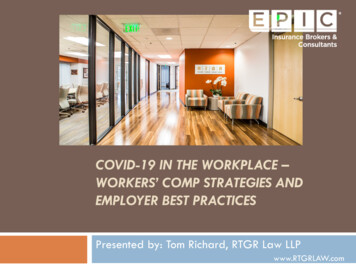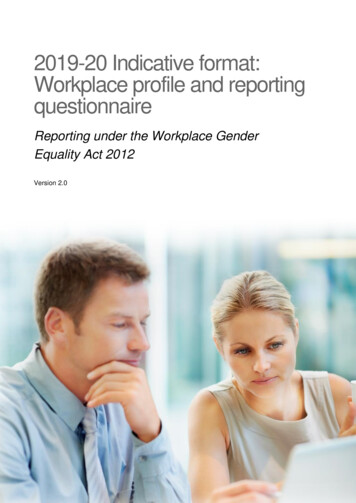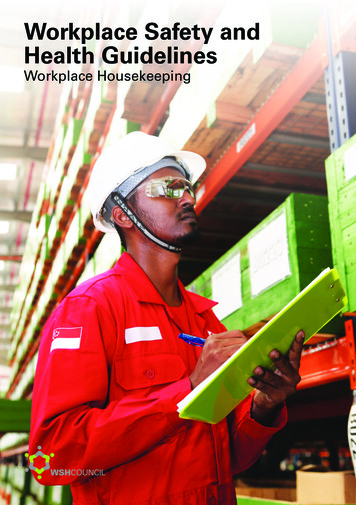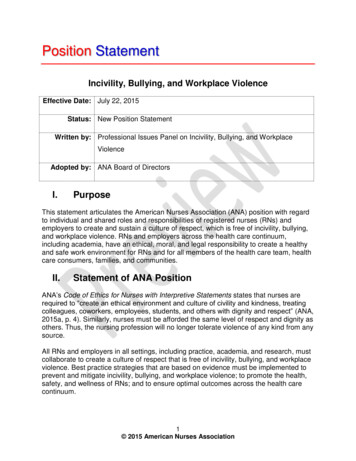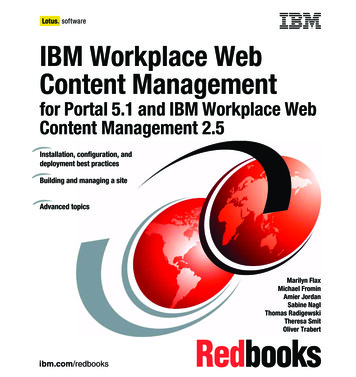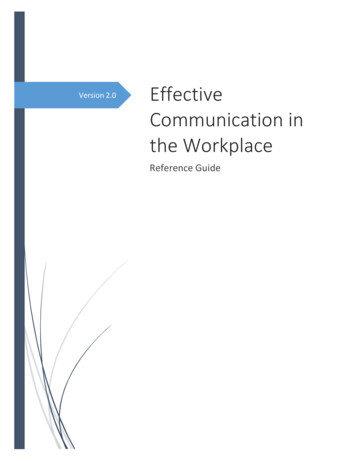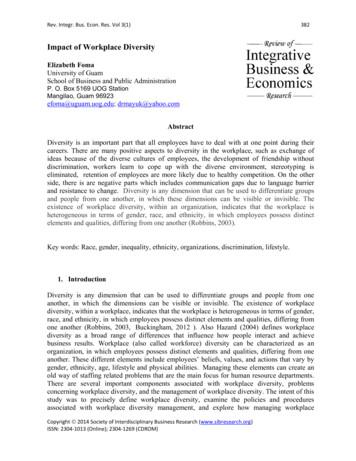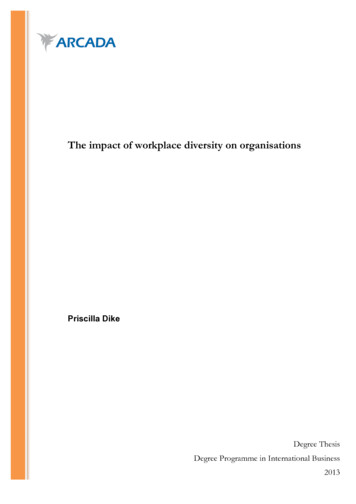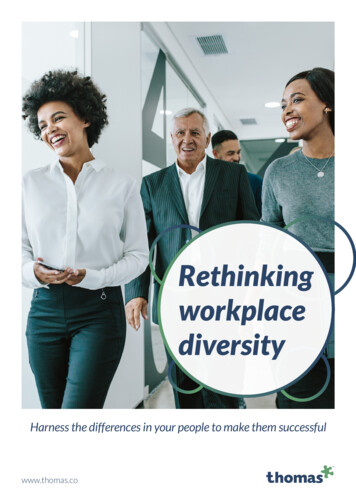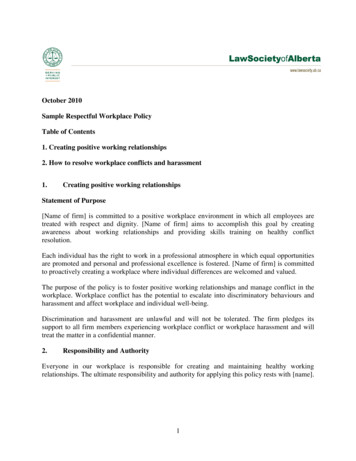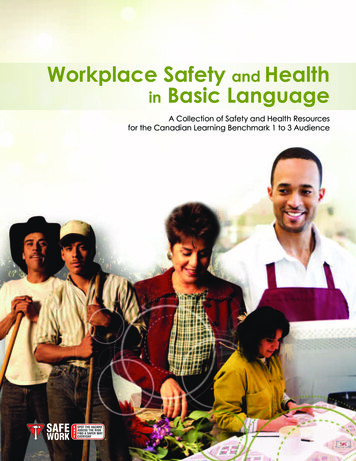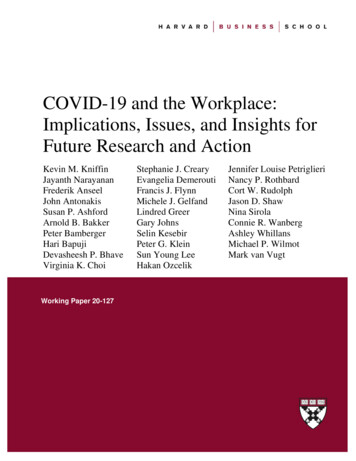
Transcription
COVID-19 and the Workplace:Implications, Issues, and Insights forFuture Research and ActionKevin M. KniffinJayanth NarayananFrederik AnseelJohn AntonakisSusan P. AshfordArnold B. BakkerPeter BambergerHari BapujiDevasheesh P. BhaveVirginia K. ChoiWorking Paper 20-127Stephanie J. CrearyEvangelia DemeroutiFrancis J. FlynnMichele J. GelfandLindred GreerGary JohnsSelin KesebirPeter G. KleinSun Young LeeHakan OzcelikJennifer Louise PetriglieriNancy P. RothbardCort W. RudolphJason D. ShawNina SirolaConnie R. WanbergAshley WhillansMichael P. WilmotMark van Vugt
COVID-19 and the Workplace:Implications, Issues, and Insights forFuture Research and ActionKevin M. Kniffin,Stephanie J. CrearyJennifer Louise PetriglieriCornell UniversityUniversity of PennsylvaniaINSEADJayanth NarayananEvangelia DemeroutiNancy P. RothbardNational University of SingaporeEindhoven University of TechnologyUniversity of PennsylvaniaFrederik AnseelFrancis J. FlynnCort W. RudolphUniversity of New South WalesStanford UniversitySaint Louis UniversityJohn AntonakisMichele J. GelfandJason D. ShawUniversity of LausanneUniversity of Maryland, College ParkNanyang Technological University, SingaporeSusan P. AshfordLindred GreerNina SirolaUniversity of MichiganUniversity of MichiganSingapore Management UniversityArnold B. BakkerGary JohnsConnie R. WanbergErasmus University RotterdamConcordia UniversityUniversity of Minnesota SchoolPeter BambergerSelin KesebirAshley WhillansTel Aviv UniversityLondon Business SchoolHarvard Business SchoolHari BapujiPeter G. KleinMichael P. WilmotUniversity of MelbourneBaylor UniversityUniversity of ArkansasDevasheesh P. BhaveSun Young LeeMark van VugtSingapore Management UniversityUniversity College LondonVrije Universiteit AmsterdamVirginia K. ChoiHakan OzcelikUniversity of Maryland, College ParkCalifornia State University, SacramentoWorking Paper 20-127Copyright 2020 by Kevin M. Kniffin, Jayanth Narayanan, Frederik Anseel, John Antonakis, Susan P. Ashford, Arnold B. Bakker, PeterBamberger, Hari Bapuji, Devasheesh P. Bhave, Virginia K. Choi, Stephanie J. Creary, Evangelia Demerouti, Francis J. Flynn, Michele J. Gelfand,Lindred Greer, Gary Johns, Selin Kesebir, Peter G. Klein, Sun Young Lee, Hakan Ozcelik, Jennifer Louise Petriglieri, Nancy P. Rothbard, CortW. Rudolph, Jason D. Shaw, Nina Sirola, Connie R. Wanberg, Ashley Whillans, Michael P. Wilmot, and Mark van Vugt.Working papers are in draft form. This working paper is distributed for purposes of comment and discussion only. It may not be reproduced withoutpermission of the copyright holder. Copies of working papers are available from the author.Funding for this research was provided in part by Harvard Business School.
COVID-19 and the Workplace1June 5, 2020 DraftNot Yet Peer-ReviewedPlease do not copy or cite without the authors’ permissionCOVID-19 and the Workplace:Implications, Issues, and Insights for Future Research and ActionKevin M. Kniffin1, Jayanth Narayanan2, Frederik Anseel3, John Antonakis4, Susan P. Ashford5,Arnold B. Bakker6, Peter Bamberger7, 8, Hari Bapuji9, Devasheesh P. Bhave10, Virginia K.Choi11, Stephanie J. Creary12, Evangelia Demerouti13, Francis J. Flynn14, Michele J. Gelfand11,Lindred Greer5, Gary Johns15, 16, Selin Kesebir17, Peter G. Klein18, Sun Young Lee19, HakanOzcelik20, Jennifer Louise Petriglieri21, Nancy P. Rothbard12, Cort W. Rudolph22, Jason D.Shaw23, Nina Sirola10, Connie R. Wanberg24, Ashley Whillans25, Michael P. Wilmot26, andMark van Vugt27Author NoteKevin M. Kniffin, Jayanth Narayanan, and Mark van Vugt conceptualized the article and wrotethe original and revised versions with multiple rounds of input, editing, and review by eachadditional co-author (listed alphabetically by last name) Frederik Anseel, John Antonakis, SusanP. Ashford, Arnold B. Bakker, Peter Bamberger, Hari Bapuji, Devasheesh P. Bhave, Virginia K.Choi, Stephanie J. Creary, Evangelia Demerouti, Francis J. Flynn, Michele J. Gelfand, LindredGreer, Gary Johns, Selin Kesebir, Peter G. Klein, Sun Young Lee, Hakan Ozcelik, JenniferLouise Petriglieri, Nancy P. Rothbard, Cort W. Rudolph, Jason D. Shaw, Nina Sirola, Connie R.Wanberg, Ashley Whillans, and Michael P. Wilmot.Corresponding Author:Kevin M. KniffinDyson School of Applied Economics and ManagementSC Johnson College of BusinessCornell Universityemail: kmk276@cornell.edu
COVID-19 and the Workplace1Dyson School of Applied Economics and Management, SC Johnson College of Business,Cornell University2National University of Singapore3UNSW Business School, UNSW Sydney4University of Lausanne5Stephen M. Ross School of Business, University of Michigan6Center of Excellence for Positive Organizational Psychology, Erasmus University Rotterdam7Coller School of Management, Tel Aviv University8Smithers Institute, Cornell University9University of Melbourne10Singapore Management University11University of Maryland, College Park12The Wharton School, University of Pennsylvania13Eindhoven University of Technology14Graduate School of Business, Stanford University15John Molson School of Business, Concordia University16Sauder School of Business, University of British Columbia17London Business School18Hankamer School of Business, Baylor University19UCL School of Management20California State University, Sacramento21INSEAD22Saint Louis University23Nanyang Technology University, Singapore24University of Minnesota25Harvard Business School26Sam M. Walton College of Business, University of Arkansas27Vrije Universiteit Amsterdam2
COVID-19 and the Workplace3COVID-19 and the Workplace:Implications, Issues, and Insights for Future Research and ActionAbstractCOVID-19’s impacts on workers and workplaces across the globe have been dramatic. Wepresent a broad review of prior research rooted in work and organizational psychology, andrelated fields, for making sense of the implications for employees, teams, and workorganizations. Our review and preview of relevant literatures focuses on: (i) emerging changes inwork practices (e.g., working from home, virtual teams) and (ii) economic and socialpsychological impacts (e.g, unemployment, mental well-being). In addition, we examine thepotential moderating factors of age, race and ethnicity, gender, family status, personality, andcultural differences to generate disparate effects. Illustrating the benefits of team science, ourbroad-scope overview provides an integrative approach for considering the implications ofCOVID-19 for work and organizations while also identifying issues for future research andinsights to inform solutions.Keywords: COVID-19; Employees; Work; Work From Home (WFH); Pandemics
COVID-19 and the Workplace4COVID-19 is both a global health crisis and an international economic threat. Theworldwide lockdown of businesses and industries that were implemented and mandated to curbthe spread of the virus generated a wide array of unique and fundamental challenges for bothemployees and employers across the globe. At the individual level, populations of shutdownaffected employees were turned overnight into (a) “work from home” employees, (b) “essential”or “life-sustaining” workers (e.g., emergency room medical personnel and supermarket staff), or(c) furloughed or laid-off employees seeking the nation-specific equivalent of unemploymentbenefits. Organizationally, the economic shutdowns and related governmental activities appearlikely to (i) change some industries fundamentally, (ii) accelerate trends that were alreadyunderway in others, and (iii) open opportunities for novel industries to emerge, as typicallyhappens in times of wars and natural disasters (e.g., Sine & David, 2003). Given the uncertaintyand breadth of the COVID-19 shock, work and organizational psychologists urgently need toapply the field’s current knowledge for the purpose of sensemaking to help individuals andorganizations manage risks while developing and applying solutions.Among the present unknowns, it is possible that an effective vaccine or therapeutictreatment becomes available quickly enough to limit the direct impacts of COVID-19 to less thana year. Among relevant knowns, though, a look at human history and prehistory is filled withcases where pathogenic microbes (including viruses and bacteria) have wreaked havoc onsocieties and workplaces (Diamond, 1998). As an example, between 1918-1920, the Spanish flukilled an estimated 50 million people worldwide, many of them adults between the ages of 20and 50 years. In response, many countries adopted policies to improve health and workingconditions by providing either universal health care (Europe) or employer-based insuranceschemes (US). More generally, the financial and health impacts of infectious disease have been
COVID-19 and the Workplace5linked to tighter cultural norms and practices (Gelfand, 2019), political conservatism andxenophobia (Ji, Tybur & Van Vugt, 2019), and more directive workplace leadership (Van Vugt,Hogan, & Kaiser, 2008). We also know, when considering other recent systemic shocks such asthe 9/11/2001 attacks in the United States, that such shocks can produce long-lasting globalchanges in practices and attitudes towards surveillance, security, and privacy.In the analysis we present here, we focus on the relevance of COVID-19-related risks andchanges for workers, workplaces, and work practices – and do not differentiate between thedirect health risks associated with COVID-19 and the economic fallout. Our broad survey oftopics allows us to identify a variety of economic, social, and psychological risks that workersappear likely to face as a result of COVID-19; and, notably, some of these risks are those thatresearch on prior economic contractions suggests may have adverse – and lethal – health effects(e.g., Popovici & French, 2013). By organizing our experiences as researchers in a wide array oftopical areas, we present a review of relevant literatures along with an evidence-based preview ofchanges that we expect in the wake of COVID-19 for both research and practice. To organize ourconsideraton of the multiple ways in which the current pandemic is impacting the workplace, thisreview consists of three main sections: (1) emergent changes in work practices that have beennecessary in response to the pandemic, including mandatory working from home, often in virtualsettings, on unprecedented scales; (2) economic and social-psychological impacts that are visiblein the wake of COVID-19, including unemployment, mental illness, and addiction; and, (3) theimportance of moderating factors (e.g., age, race and ethnicity, gender, personality, family status,and culture) for which there are likely to be disparate COVID-19 impacts.Beyond reviewing and applying prior research to help make sense of the crisis, we aim toprovide a generative overview to help situate and guide future research and theorizing on the
COVID-19 and the Workplace6impacts associated with COVID-19. In addition, we hope that our effort will help researchers andpractitioners take steps to manage and mitigate the negative effects of COVID-19 and startdesigning evidence-based roadmaps for moving forward. Our effort is partly modeled on VanBavel and colleagues’ (2020) engagement of COVID-19 in relation to topics such as how peopletend to respond emotionally and interpersonally in situations of uncertainty and fear. Regardingthe application of provisional-by-nature knowledge from the social and behavioral sciences tounderstanding and responding to COVID-19, we agree with the cautions recommended byIJzerman et al. (2020). In this team-produced review and preview of literatures relevant to workand organizational psychology that leverages the benefits that can be gained through cooperationamong researchers with differential expertise (Kniffin & Hanks, 2018), we embrace and applythe case study approach that is common across the classrooms of professional schools – to workwith the knowledge and information that is available – while providing a holistic narrativereview (Baumeister & Leary, 1997). Given the wide-ranging impacts of COVID-19, our focus onwork and organizational psychology is intended to be aptly broad and inclusive but there areinevitably additional “workplace” topics outside of our scope (e.g., handwashing and hygiene).Emergent Changes in Work PracticesWhile COVID-19 abruptly upended normal work routines, it also caused an acceleration oftrends that were already underway involving the migration of work to online or virtualenvironments. A key difference when considering research on practices such as Work FromHome (WFH) prior to the pandemic, though, is that WFH was previously often responsive toemployee preferences but COVID-19 forced many into Mandatory Work From Home (MWFH).Work from Home (WFH). A Gartner (2020) survey of 229 Human Resources (HR)departments showed that approximately one-half of the companies had more than 80% of their
COVID-19 and the Workplace7employees working from home during early stages of the COVID-19 pandemic – and estimatedsubstantial long-term increases for remote work after the pandemic. The need for millions ofworkers to WFH in response to COVID-19 has accelerated recent remote work trends facilitatedby the rise of connectivity and communication technologies. While “remote work” is a broadercategory since it can include Work From Anywhere (i.e., not necessarily home), we do know thatsome – such as professionals who need to perform complex tasks that require little interactionwith peers – actually prefer and are more productive if they WFH (Allen, Cho, & Meier, 2014).Yet as large numbers of workers are forced to work from home, many face challenges due tosuch fundamental issues as not having space in one's home to attend to work. Employees wholive with others also face a larger set of challenges than those who live alone since they need tonavigate others' space as well (see later section on Family Status).Employees often find it challenging to maintain boundarie
This working paper is distributed for purposes of comment and discussion only. It may not be reproduced without permission of the copyright holder. Copies of working papers are available from the author. Funding for this research was provided rt by Harvard Business School.in pa ; COVID-19 and the Workplace: Implications, Issues, and Insights for Future Research and Action ; Kevin M. Kniffin .
